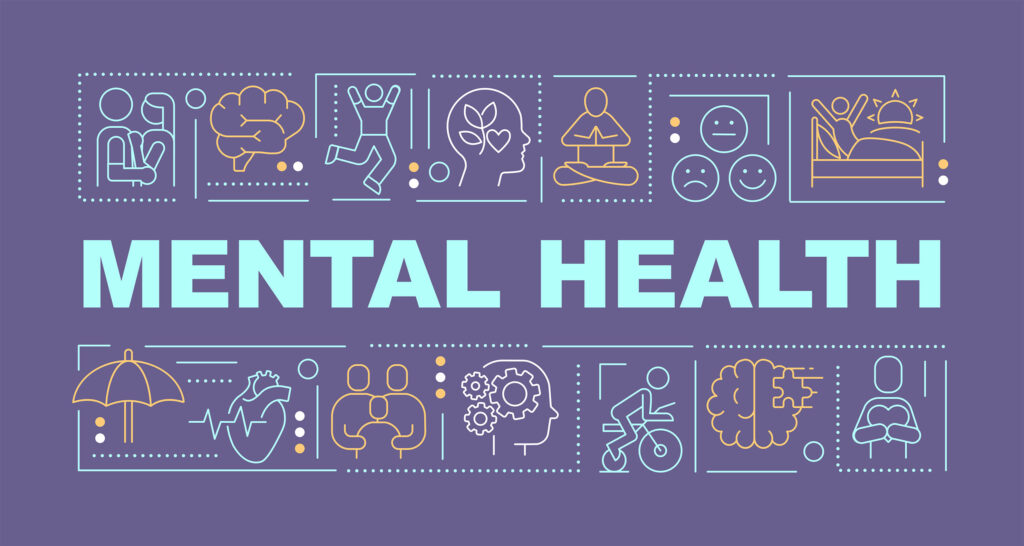The Importance of Mental Wellness: a Deep Study Counseling, Treatment, and Their Benefits
Psychological health and wellness greatly shapes private well-being, influencing thoughts, actions, and feelings. Therapy and treatment serve as crucial methods for healing and individual advancement. They offer organized assistance, helping individuals browse life's obstacles. Several stay unaware of the details types of therapy available and their unique benefits. Understanding these aspects is very important for any individual taking into consideration expert mental health and wellness support. What adheres to might light up paths to resilience and fulfillment that lots of neglect.
Understanding Mental Health and Its Influence
Although psychological wellness is typically ignored, it plays an important role in total well-being and everyday functioning. It encompasses emotional, psychological, and social factors that affect exactly how people assume, really feel, and act. An individual's psychological health and wellness straight influences their capacity to handle stress and anxiety, associate with others, and choose. Poor psychological health and wellness can bring about numerous issues, consisting of stress and anxiety, clinical depression, and problem in preserving partnerships, all of which can impede individual and professional growth.Furthermore, psychological wellness has far-reaching implications for physical health and wellness. Chronic stress and neglected psychological conditions can contribute to different physical disorders, such as cardiovascular disease and deteriorated immune actions. On the other hand, favorable mental wellness fosters strength, enabling people to handle life's challenges properly. Understanding psychological health and wellness's value is crucial for promoting encouraging environments that promote emotional well-being, thereby enhancing the high quality of life for individuals and neighborhoods alike
The Different Kinds of Counseling and Treatment
In the domain of mental health, various counseling and therapy types satisfy varied demands. Private therapy methods concentrate on individual issues through one-on-one sessions, while team treatment characteristics foster shared experiences and assistance among individuals. Understanding these techniques is crucial for choosing the ideal intervention for various challenges.
Individual Counseling Approaches
Numerous individual counseling approaches exist, each designed to deal with specific mental health issues and satisfy varying customer needs. Cognitive Behavior Therapy (CBT) concentrates on recognizing and transforming adverse idea patterns, while Psychodynamic Treatment explores unconscious procedures and past experiences. Humanistic Therapy highlights individual growth and self-actualization, cultivating a helpful atmosphere. Interpersonal Therapy (IPT) targets relationship concerns and interaction patterns to enhance psychological wellness. In addition, Approval and Dedication Therapy (ACT) motivates clients to accept their thoughts and sensations while devoting to individual worths. Each approach provides one-of-a-kind methods and approaches, enabling professionals to customize their methods to the individual, thus boosting the restorative experience and advertising mental wellness recovery.
Group Treatment Dynamics
Group treatment characteristics include numerous therapeutic techniques that take advantage of the power of shared experiences and interpersonal partnerships. This kind of treatment usually includes diverse teams, cultivating a safe atmosphere for individuals to share sensations and thoughts. Key kinds of team therapy consist of support system, which supply psychological assistance; process-oriented teams, focusing on social communications; and psychoeducational groups, targeted at passing on understanding about mental health problems. The dynamics within these teams can enhance self-awareness, as participants often reflect on their behaviors in connection with others. In addition, group treatment fosters a sense of belonging, minimizing feelings of seclusion. Via shared narratives and collective analytic, individuals can develop dealing strategies and get understandings, inevitably adding to individual growth and recovery.
The Function of Therapy in Mental Health
Counseling plays a vital role in psychological health by offering various methods customized to private needs. These methods supply professional assistance that can cause substantial improvements in psychological well-being. Recognizing the various sorts of counseling can help people make notified decisions regarding their mental wellness care.

Kinds Of Counseling Techniques
While various counseling methods exist, each deals special methods and understandings into psychological wellness therapy - Couples Therapy. Among one of the most noticeable are cognitive-behavioral treatment (CBT), which concentrates on modifying negative thought patterns; psychodynamic therapy, which explores subconscious procedures and youth experiences; and humanistic methods, emphasizing personal development and self-actualization. In addition, solution-focused quick treatment focuses on finding options in today instead of diving into troubles. Group therapy fosters area and shared experiences, while household treatment addresses relational characteristics within familial frameworks. Each method provides to various needs, straightening with specific preferences, problems, and restorative goals. Understanding these methods aids customers make informed selections regarding their mental health and wellness trip and promotes reliable therapy customized to their special conditions
Benefits of Expert Advice
Various individuals gain from expert assistance in handling their psychological health obstacles. Counseling offers a safe room for clients to explore their thoughts and feelings without judgment. This therapeutic atmosphere cultivates self-awareness, permitting individuals to recognize patterns in their habits and establish healthier coping techniques. Expert advice also provides accessibility to evidence-based techniques that can ease signs and symptoms of stress and anxiety, clinical depression, and various other mental wellness issues. Therapists can aid in setting reasonable objectives and use assistance in attaining them, improving general health. The joint partnership in between therapist and customer is important, as it promotes accountability and motivates personal development. Inevitably, professional assistance plays a vital duty in guiding mental wellness journeys, resulting in boosted psychological strength and life satisfaction.
Advantages of Therapy: Healing and Growth

Exactly how to Select the Right Specialist or Therapist
Exactly how can one navigate the usually overwhelming procedure of choosing the ideal specialist or therapist? Recognizing individual needs is important; individuals need to consider their details problems, whether anxiousness, anxiety, or partnership difficulties. It is beneficial to research study various restorative approaches, such as cognitive-behavioral therapy or psychodynamic therapy, to find a suitable match.Next, prospective customers need special info to seek referrals from relied on sources or use on the internet directory sites. It is vital to evaluate specialists' qualifications, including their education, licensing, and areas of field of expertise. Setting up initial appointments can help evaluate compatibility, permitting individuals to examine interaction styles and individual comfort.Finally, logistical variables, such as place, accessibility, and charges, should additionally be considered. By thoughtfully evaluating these components, one can make an informed choice, ultimately promoting a restorative connection that sustains psychological health and wellness and personal development.
Overcoming Stigma: Welcoming Mental Health And Wellness Assistance
While social perspectives toward mental health and wellness have actually developed, preconception still presents a considerable barrier for many seeking support. This preconception often manifests as mistaken beliefs surrounding mental disorder, leading people to feel embarassment or worry regarding their struggles. Lots of people wait to pursue therapy or therapy content because of fret about being evaluated or classified. Overcoming this preconception is basic for fostering an encouraging setting where individuals can openly review their psychological wellness needs.Communities and companies play an important duty in this improvement by promoting awareness and education and learning about psychological health concerns. Campaigns that highlight personal tales can humanize these experiences, encouraging others to seek help without worry. As approval expands, people might feel much more empowered to embrace psychological health and wellness support, identifying it as an important facet of general well-being. By taking down stigma, culture can grow a culture of understanding, compassion, and proactive mental healthcare.
Approaches for Keeping Psychological Health Outside of Therapy
Therapy supplies beneficial support, preserving psychological wellness outside of sessions is just as essential. Individuals can apply a this number of techniques to sustain their psychological wellness. Regular exercise plays an essential role, as workout advertises the release of endorphins, which improve mood. Additionally, a balanced diet plan rich in nutrients can significantly impact psychological stability and power levels.Practicing mindfulness and meditation helps people manage anxiety and establish greater self-awareness. Developing a regular sleep routine is additionally basic, as top quality rest is critical for cognitive feature and psychological regulation.Engaging in social tasks cultivates link and reduces feelings of seclusion. Going after pastimes or passions can provide a creative electrical outlet and boost self-confidence. Lastly, practicing and setting practical goals self-compassion enables people to grow strength. By incorporating these techniques right into day-to-day live, individuals can successfully sustain their mental well-being past therapy sessions.
Frequently Asked Concerns

How Can I Inform if I Required Treatment?

Figuring out the demand for treatment typically includes identifying consistent feelings of despair, anxiety, or overwhelming stress and anxiety. If daily operating ends up being difficult or coping devices fail, looking for specialist assistance might be a useful advance.
What Should I Anticipate in My Initial Treatment Session?
In the very first therapy session, individuals can anticipate an introduction, discussion of their reasons for seeking assistance, and a review of the therapist's method, creating a structure for future conversations and establishing convenience in the healing room.
Are Online Therapy Procedure as Effective as In-Person Ones?
Study indicates that online treatment sessions can be as effective as in-person ones. Aspects such as the specialist's qualifications, customer involvement, and the therapeutic relationship greatly influence results, despite the medium made use of.
Can Treatment Assist With Partnership Problems?
Therapy can assist people in dealing with partnership problems by offering tools for interaction, understanding feelings, and fixing problems. Couples Therapy. It promotes healthier dynamics and encourages personal development, inevitably fostering stronger, much more meeting links in between companions
How Long Does Treatment Commonly Last?
Treatment period varies considerably based on private needs and objectives. Generally, sessions may last from a few weeks to numerous months, with some individuals taking part in recurring therapy to address long-term issues and personal growth. Cognitive Behavioral Therapy (CBT) focuses on determining and altering negative thought patterns, while Psychodynamic Treatment discovers previous experiences and unconscious procedures. Key types of team therapy consist of assistance teams, which provide psychological support; process-oriented groups, concentrating on interpersonal interactions; and psychoeducational groups, intended at presenting expertise about psychological wellness concerns. Among the most famous are cognitive-behavioral treatment (CBT), which concentrates on altering unfavorable thought patterns; psychodynamic treatment, which discovers unconscious processes and childhood years experiences; and humanistic techniques, emphasizing individual development and self-actualization. Group treatment promotes neighborhood and shared experiences, while family members therapy addresses relational characteristics within domestic structures. It is beneficial to research numerous restorative approaches, such as cognitive-behavioral therapy or psychodynamic treatment, to discover an appropriate match.Next, prospective clients must seek recommendations from trusted sources or utilize online directories.